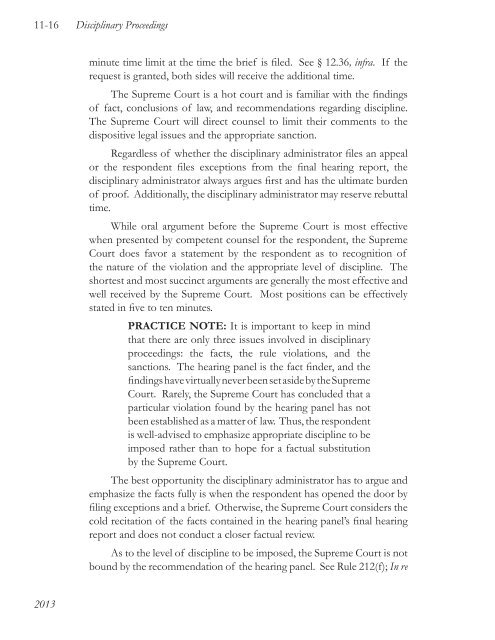CHAPTER 11 - Disciplinary Proceedings - Kansas Judicial Branch
CHAPTER 11 - Disciplinary Proceedings - Kansas Judicial Branch
CHAPTER 11 - Disciplinary Proceedings - Kansas Judicial Branch
Create successful ePaper yourself
Turn your PDF publications into a flip-book with our unique Google optimized e-Paper software.
<strong>11</strong>-16 <strong>Disciplinary</strong> <strong>Proceedings</strong><br />
minute time limit at the time the brief is filed. See § 12.36, infra. If the<br />
request is granted, both sides will receive the additional time.<br />
The Supreme Court is a hot court and is familiar with the findings<br />
of fact, conclusions of law, and recommendations regarding discipline.<br />
The Supreme Court will direct counsel to limit their comments to the<br />
dispositive legal issues and the appropriate sanction.<br />
Regardless of whether the disciplinary administrator files an appeal<br />
or the respondent files exceptions from the final hearing report, the<br />
disciplinary administrator always argues first and has the ultimate burden<br />
of proof. Additionally, the disciplinary administrator may reserve rebuttal<br />
time.<br />
While oral argument before the Supreme Court is most effective<br />
when presented by competent counsel for the respondent, the Supreme<br />
Court does favor a statement by the respondent as to recognition of<br />
the nature of the violation and the appropriate level of discipline. The<br />
shortest and most succinct arguments are generally the most effective and<br />
well received by the Supreme Court. Most positions can be effectively<br />
stated in five to ten minutes.<br />
PRACTICE NOTE: It is important to keep in mind<br />
that there are only three issues involved in disciplinary<br />
proceedings: the facts, the rule violations, and the<br />
sanctions. The hearing panel is the fact finder, and the<br />
findings have virtually never been set aside by the Supreme<br />
Court. Rarely, the Supreme Court has concluded that a<br />
particular violation found by the hearing panel has not<br />
been established as a matter of law. Thus, the respondent<br />
is well-advised to emphasize appropriate discipline to be<br />
imposed rather than to hope for a factual substitution<br />
by the Supreme Court.<br />
The best opportunity the disciplinary administrator has to argue and<br />
emphasize the facts fully is when the respondent has opened the door by<br />
filing exceptions and a brief. Otherwise, the Supreme Court considers the<br />
cold recitation of the facts contained in the hearing panel’s final hearing<br />
report and does not conduct a closer factual review.<br />
As to the level of discipline to be imposed, the Supreme Court is not<br />
bound by the recommendation of the hearing panel. See Rule 212(f); In re<br />
2013

















